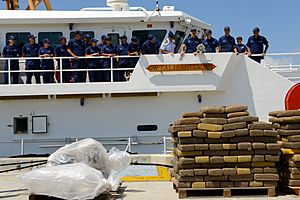Contraband facts for kids

The word contraband comes from an old French word meaning "smuggling." It refers to anything that is illegal to own or sell. This can include items that have been smuggled into a country without permission. It also includes stolen goods. If someone knowingly deals with stolen items, it's a crime called fencing. Contraband can also be things made through fraud or forgery.
Contraband in Wartime
In international law, contraband has a special meaning during a war. It refers to goods sent to areas controlled by an enemy that could help them fight.
Traditionally, there are two types of wartime contraband:
- Absolute contraband includes things like weapons, bullets, and certain chemicals or machinery. These items are always considered useful for war.
- Conditional contraband includes items like food and animal feed. These are usually harmless. However, they can be seized if they are clearly meant for the enemy's army. In modern wars, almost anything can be seen as absolute contraband because so many things can be used to support a war effort.
Contraband During the American Civil War
During the American Civil War, a special use of the word "contraband" came about. Enslaved people who escaped and found safety with the Union army were called "contraband." This idea was first used by General Benjamin F. Butler in 1861. It became known as the "Fort Monroe Doctrine."
Many of these former slaves worked for the Union Army for pay. By the end of the war, the Union had set up about 100 "contraband camps" in the Southern United States. One example was the Roanoke Island Freedmen's Colony, which was meant to be a new settlement for these individuals.
 | Frances Mary Albrier |
 | Whitney Young |
 | Muhammad Ali |


